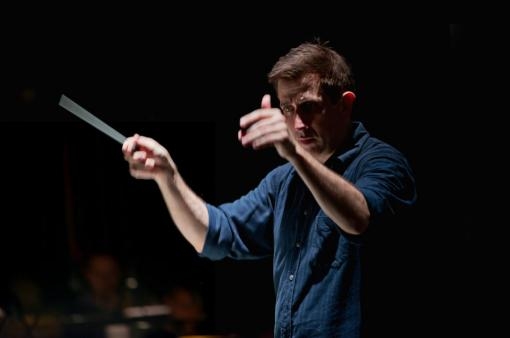Free Radicals (Böse Zellen) is the title of a piano concerto by Thomas Larcher (1963), which will be played next week in Besední dům in Czech premiere. When composing it, the author was inspired by a film of the same name by the Austrian director Barbara Albert. The concert is conducted by Nicholas Milton. The work of Thomas Larcher will be heard twice, and a meeting with the dramaturge Vítězslav Mikeš will take place before both concerts, introducing the audience to the world of the upcoming compositions.
Larcher commented on his work as follows: "The film did not provide me with any storyline idea as a programme, but with its feeling I tried for long months to capture the horizontal structure of human life, that is, to determine and name the direction it should or could be developed and fulfilled".
In this approximately 20-minute concert, percussionists will play for example on an empty barrel, while some brass players will take on the job of percussionists. Austrian pianist Aaron Pilsan, an extraordinarily talented musician who performs on world stages and collaborates with many authors, such as Larcher, will sit behind the piano. He likes to use non-traditional percussion instruments in his works. Two weeks ago, the American premiere of his symphony Kenotaph (The Empty Tomb) took place; it is dedicated to refugees who drowned in the Mediterranean Sea. In this symphony, too, percussionists play on empty barrels or instruments that evoke a thunderstorm. Semyon Bychkov, Chief Conductor of the Czech Philharmonic, premiered this composition with the New York Philharmonic.
In Brno, Larcher's piece will be heard on Thursday and Friday 16 and 17 May as the last concert of the "Classically and Modernly" subscription series. At the beginning, Dances from Galanta by the Hungarian composer Zoltán Kodály will be played, expressing in music his memories of the place where he spent his childhood. "A famous Gypsy band used to play there, which was actually the first symphonic sound that had ever come to my ears," Kodály described his symphony. This sixteen-minute congruent symphonic work consists of five parts, in which it preserves the traditional structure of "verbuňk" [folk dance of recruits] alternating slow and fast parts. In the second half of the evening, Symphony No. 4 of Robert Schumann, one of the founders of the Romantic generation, will be performed. Schumann dedicated it as a birthday gift to his wife Clara.
The Brno Philharmonic will perform this concert under the baton of Nicholas Milton, General Music Director in Göttingen, Artistic Director and Chief Conductor of Orchestras in Canberra and Willoughby, Australia. Before each concert, a meeting is prepared for the audience, during which the dramaturge Vítězslav Mikeš will present interesting facts about the compositions that are to be performed later in the concert hall. The meeting takes place from 6.15 to 7.00 pm in the director's lounge of Besední dům; due to limited capacity, it is necessary to sign up in advance by e-mail info@filharmonie-brno.cz. Tickets for both shows are available in box offices or on-line.













No comment added yet..